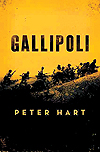
Gallipoli, by Peter Hart, Oxford University Press, New York, 2011, $34.95
Books on the 1915 Gallipoli Campaign have been quite common in recent years, and more will inevitably emerge as its centennial approaches. Peter Hart’s new study nevertheless merits attention. Hart, oral historian at London’s Imperial War Museum, is an expert on British participation in World War I and combines the scholar’s devotion to solid research with the oral historian’s appreciation for personal perspective.
Gallipoli, he states early on, “was a lunacy that never could have succeeded, an idiocy generated by muddled thinking.” In conception the campaign was rank stupidity on the part of First Lord of the Admiralty Winston Churchill. The war’s outcome almost solely depended on events on the Western Front, and the attempt to knock the Ottoman Empire out of the war by landing troops on the Gallipoli Peninsula was a useless diversion of resources.
In execution the campaign suffered from the mismanagement of General Sir Ian Hamilton, whose complacence and unnecessarily complex planning all but guaranteed failure. Moreover, the logistical difficulties of fighting a campaign so far from Great Britain, and the inexperience and generally poor leadership of the troops who fought it, led to horrific casualties. Hart correctly credits the toughness and bravery of the Turkish troops defending the peninsula, incorporating some Turkish sources into his research and chronicling how Gallipoli played a pivotal role in the rise to power of Lt. Col. Mustafa Kemal Atatürk, Turkey’s future president.
While Hart’s arguments about Gallipoli are for the most part nothing new, what distinguishes this book is his research into a trove of primary source material, in particular soldiers’ accounts of their experiences. Gallipoli is replete with lengthy and compelling quotations by Australian, British, French and Turkish soldiers, most never before published. Hart’s intimate familiarity with the battlefield, where he leads regular tours, adds a level of understanding absent from other books. Overall, Gallipoli is an important contribution to the growing literature on this epic and tragic campaign.
—Edward G. Lengel




